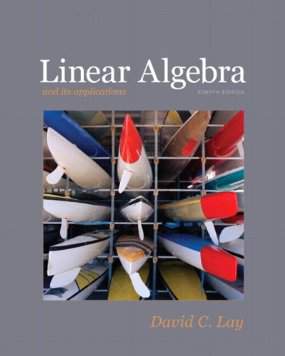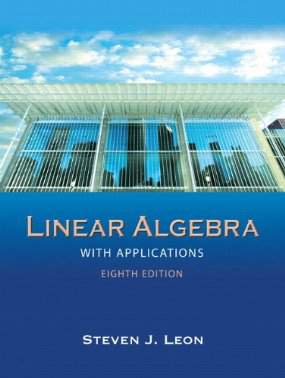Connecting...

This is a quick preview of the lesson. For full access, please Log In or Sign up.
For more information, please see full course syllabus of Linear Algebra
For more information, please see full course syllabus of Linear Algebra
Linear Algebra Linear Independence
Lecture Description
As with the last video, this topic is short and conceptually easy, and will teach you another property of vectors. Linear dependence can be thought of as a study group; in a study group, you rely on others to bounce ideas off of and solve problems. Linear dependence is the same thing: all the vectors depend on each other for values. If one vector doesn’t need the others, then it’s considered linear independent. After this topic we’ll get back into our discussion on properties of vector spaces.
Bookmark & Share
Embed
Share this knowledge with your friends!
Copy & Paste this embed code into your website’s HTML
Please ensure that your website editor is in text mode when you paste the code.(In Wordpress, the mode button is on the top right corner.)
×
Since this lesson is not free, only the preview will appear on your website.
- - Allow users to view the embedded video in full-size.
Next Lecture
Previous Lecture










































 Answer Engine
Answer Engine




1 answer
Wed Oct 4, 2017 2:37 AM
Post by Cliff C Morris Jr on October 3, 2017
Hello Prof, Cliff here. I noticed your lecture on Linear Independence needs to be reset or re-inserted. The 17-minute video only lasts for less than 2 minutes currently. I am thoroughly enjoying your explanations. My Linear Algebra course materials in about 45 years old. Great getting back into the material. Cheers!
1 answer
Tue Sep 23, 2014 1:49 AM
Post by Sheena Patel on September 22, 2014
Would it be possible to just look at a matrix problem and figure it is non-trival, trival, linear independent or dependent, consistant, inconsisent all at once?
1 answer
Wed Sep 25, 2013 5:19 PM
Post by Christian Fischer on September 25, 2013
Hi Raffi, I know I have a bunch of questions but it's because I'm really into your lectures! There is one thing I can't understand mathematically from example 2 (14 minutes in)
If you have the sum of 3 terms t^2(---) + t(---) + (---) = 0
How can you then set each individual term equal to zero? I know from multiplication that if a*(x-a)= zero then both terms a=0 and (x-a) = 0, but I did not think it applied to addition?
Is there something I'm not seeing properly?
1 answer
Tue Sep 24, 2013 2:52 PM
Post by Vivek Sharma on September 24, 2013
Hi Prof .Raffi..i am doing linear algebra course from uni in australia ...i was very depressed about my performance as i have only a month in exams.. but now i believe after hearing your lectures that i am still in the market.
i will really appreciate if u can upload a video on inner product spaces and gram- schmidit process etc...
With kind regards....
1 answer
Last reply by: Mary Shriver
Mon Feb 18, 2013 12:14 AM
Post by Mary Shriver on February 17, 2013
For example 2 you have written a non trivial solution= dependence. I could just be confused and I will watch the example again but should it be independence when there are non trivial solutions. Your teachings are very helpful.